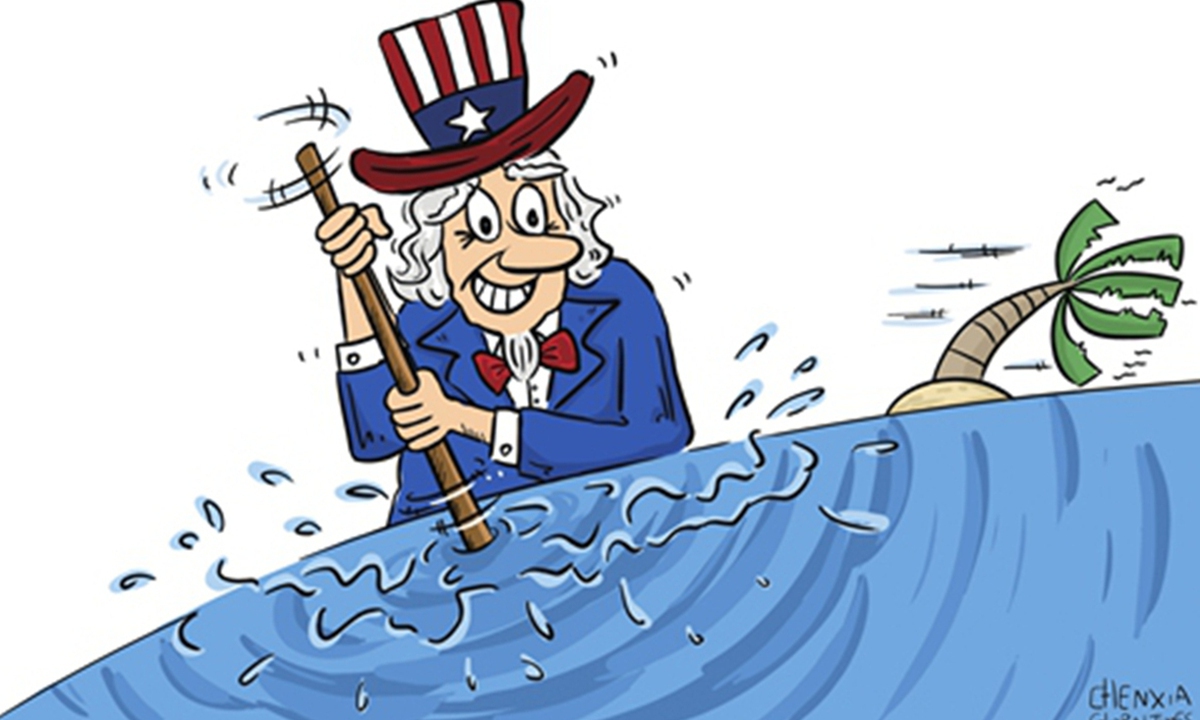ASEAN, China economic partnership will sustain US’ deliberate sabotage
By Huo Jianguo Source: Global Times Published: 2020/11/26 17:46:42

Illustration: Chen Xia/GT
US National Security Adviser Robert O'Brien concluded visits to the Philippines and Vietnam a few days ago, which follows US Secretary of State Mike Pompeo's visit to Vietnam at the end of last month.In addition to trying to provoke the Asian countries' relations with China relating to the South China Sea as Pompeo attempted to do, O'Brien warned Vietnamese leaders they must curb "illegal re-routing of Chinese exports" and must purchase more US goods, including US weapons and other equipment.
This type of ultimatum is something that can only be done by top-ranking US officials, other countries would avoid the implicitly menacing threats.
It's hard to understand how the US officials have the confidence to dictate other countries like this, but their madness is perhaps driven by the following considerations.
For starters, the Regional Comprehensive Economic Partnership (RCEP), which covers 15 countries and 30 percent of the global economy, has been recently agreed upon and signed. The establishment of the largest free trade zone in the world marks the beginning of a new era of regional trade and investment. It provides new opportunities to consolidate and improve investment and trade cooperation across the Asia-Pacific region.
As the most dynamic region in the world, East Asia, particularly China, the largest market in the region, has attracted rising attention. The US feels threatened by China expanding cooperation in the Asia-Pacific region by building strong, mutually beneficial partnerships, offsetting US efforts to strangle China's economic development.
This is the main reason US officials rush to fly to Asian countries to issue their dictation. However, it should be noted that signing the RCEP was the voluntary choice of these 15 economies. Deepening cooperation in the region will only inject new impetus into the global economy, contributing to global growth. It's not like the US-Mexico-Canada Free Trade Agreement (USMCA), which has inserted a "poison pill" clause.
Many countries support multilateralism, and are willing to strengthen mutually beneficial cooperation to achieve shared prosperity. The US' actions only focus on groundless and irrelevant distractions.
Secondly, the US' focus on Vietnam may be against Vietnam's own interests. In recent years, Vietnam's externally-oriented economy model has driven fast-paced development. China-Vietnam trade investment cooperation has played a significant role. According to official Vietnamese statistics, in 2019, the country's trade of commodities reached $517 billion, exports reached $263 billion, up 8.1 percent. During the same period, trade between China and Vietnam was $162 billion, up 8.5 percent, bilateral trade have maintained healthy and stable growth.
In spite of COVID-19, China and Vietnam's exports have maintained growth over the first nine month of 2020. While many economies in the world are experiencing contraction, China and Vietnam have entered a recovery phase.
China and Vietnam have strong complementarity in terms of trade and investment and plans to consolidate and expand bilateral trade and investment development is conducive to both country's long-term prosperity. America's deliberate obstruction and sabotage goes against the principals of shared economic development.
In addition, China holds high expectations for further strengthening cooperation with many Southeast Asia countries.
China and countries across the region share a deep history, cultural exchange, and share opportunities for trade and commerce. Market openness and free trade are mutual goals of the economies throughout the region. China's rapid economic development has created a huge domestic market. It's now the major engine to promote regional cooperation. Especially given the ongoing fight against the pandemic, strengthening cooperation and stabilizing regional economic growth has become a common goal.
China and Southeast Asia are closely tethered by trade and highly integrated industrial supply chains. Cooperation is in the mutual benefit of these countries, we have a responsibility and obligation to stabilize each other and build stronger global partnerships.
The region can grow and prosper by embracing open markets, strengthening multilateral investment and expanding new development pathways. Realizing the prosperity and development of the region is in everyone's interest, any some countries' external interference is destined to fail.
The author is a vice chairman of the China Society for World Trade Organization Studies in Beijing, and former president of the research institute of China's Ministry of Commerce. bizopinion@globaltimes.com.cn
Posted in: EXPERT ASSESSMENT